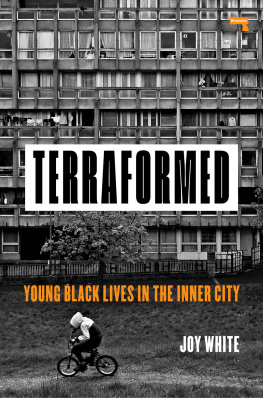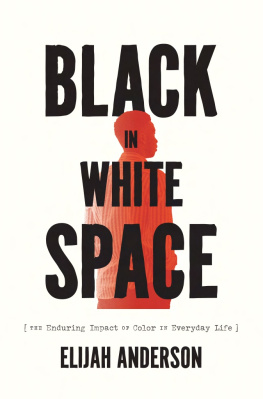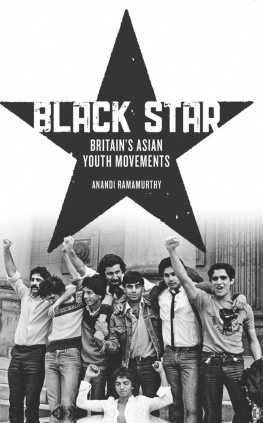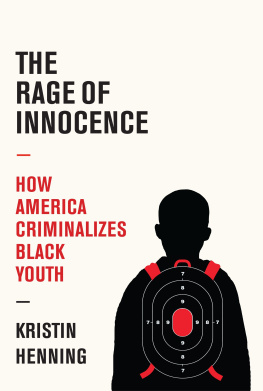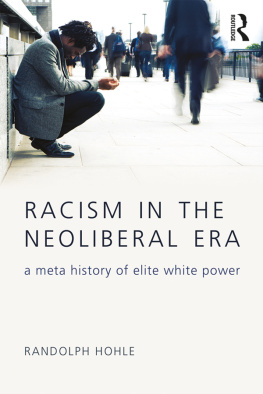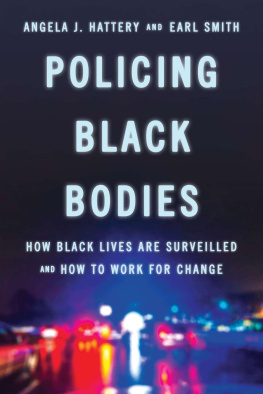


Published by Repeater Books
An imprint of Watkins Media Ltd
Unit 11 Shepperton House
89-93 Shepperton Road
London
N1 3DF
United Kingdom
www.repeaterbooks.com
A Repeater Books paperback original 2020
Distributed in the United States by Random House, Inc., New York.
Copyright Joy White 2020
Joy White asserts the moral right to be identified as the author of this work.
ISBN: 9781912248681
Ebook ISBN: 9781912248698
All rights reserved. No part of this publication may be reproduced, stored in a retrieval system, or transmitted, in any form or by any means, electronic, mechanical, photocopying, recording or otherwise, without the prior permission of the publishers.
This book is sold subject to the condition that it shall not, by way of trade or otherwise, be lent, re-sold, hired out or otherwise circulated without the publishers prior consent in any form of binding or cover other than that in which it is published and without a similar condition including this condition being imposed on the subsequent purchaser.
Printed and bound in the United Kingdom by TJ International Ltd
CONTENTS
PROLOGUE: PRIVATE TROUBLES, PUBLIC CONCERNS
Newham is a London borough. It lies north of the river Thames, five miles to the east of the City of London. Over a two-year period from 2015 to 2016, I had many conversations with four young Newham residents who were born in 1991: Matt, Chris, Michael, and Amy. Some of the conversations were brief, some in depth and at length. In our talks we explored why it seemed that, no matter how hard they tried, the road to an independent adult life was just so difficult. I refer to them as the Class of 91, using this as a shorthand for young Black lives in the inner city. I have written this book for them. One of them, Michael, wanted to know why it felt and seemed as though Black people were always at the bottom, and that young Black people from the block were often caught up and caught out but never catching a break.
I also wrote this book for Nico, my nineteen-year-old nephew who died in February 2016, several days after being stabbed. I need to record who he was, and for that record to be recognised beyond those of us who love him and miss him; for that record to be acknowledged by those who refuse to, or who seem unable to, understand that Black lives matter. Nicos life mattered. His story could have had a different outcome. When everything is taken away, including hope, these life-changing losses are destined to be endlessly repeated.
Neoliberalism ushered in free markets, deregulation of financial controls, and a move away from state intervention. Forty years on, the notion of the state as a safety blanket in case of hard times has long been forgotten. Hyper-individualism is now the name of the game. In neoliberal times, the most brutal lie is meritocracy, the idea that everyone can make it. That to make it you just have to keep at it and work hard. Meritocracy is a fabrication that masks inequalities and obstacles to success. Our contemporary capitalist system is set up so that in order for some to make it to the top, the majority must remain at the bottom. Those at the bottom are then expected to take full responsibility for being in a position where the rules of the game are neither within their control, nor of their making. For many, the gap between those two positions has become an almost unbridgeable chasm.
On the horizon, however, is the hope that can come from creativity. Even in this harsh landscape, young people continue to make music that matters to them. Grime music emerged from east London in the early years of the twenty-first century, made possible by the resourceful activities of predominantly Black working-class communities. Making and listening to music is an integral part of young lives in Newham, so the social, economic and cultural significance of grime as a creative practice is woven into the fabric of this book.
This book, Terraformed , is my attempt to connect the dots, to locate our pains and our struggles, our wins and our losses in a structural, institutional and historical context. In this way, young people who have grown up under the influence of neoliberalism can articulate their stories as part of a community, not just as individual losses or gains. The Class of 91 are acutely aware, from the questions they raised, the passing comments, the discussions that we had, that this England is not working for them. Matt, Chris, Michael, and Amy are trying to understand not just how it is but how it is for them . Young people are touched by increased levels of diagnosed anxiety and depression how does this relate to the lived experiences of being poor in an affluent world, of feeling trapped and stuck? The sense of loss is palpable when your people (parents, siblings, friends), are removed from your life in some way or another; dead, deported, in custody, or incarcerated. These types of losses are so commonplace that when young Black Londoners make a reference to someone being in, they dont mean at home, they mean in prison. Families are ruptured and friendships are constrained by rules of association, local policies and processes. Between them Matt, Chris, Michael, and Amy have had it all: huge student debt, invisible homelessness, custodial sentences, electronic tagging, surveillance, arrest, ASBOs, issues with health and well-being, and of course, loss. At a young age, they had witnessed and experienced extreme violence in the public arena. Some of this physical and verbal violence was at the hands of those who were supposed to protect them i.e. the police. Symbolic violence came from teachers, and other authority figures who labelled, shamed and excluded them.
Mask Off is the title of a song by US rapper Future. He says Fuck it, and then tells a story of trying to win when everything is pressing down on you. Future frames the lyrics within the context of using drugs to mask the harsh realities of everyday life. Its that sense of nihilism that I am addressing and providing a backdrop to. I could write about the exceptions, those that make it out unscathed somehow, but that tells us little about the everyday adversities that many young Black people go through. So, I am writing about what I see, without the mask of respectability, politeness and gratitude that has us almost beaten and reluctant to demand more.
Terraformed offers an insider ethnography of a square mile in a Newham neighbourhood Forest Gate. It offers an up close and personal perspective on how a newly arrived kinetic elite is able to move freely in this urban space. But there is another less visible landscape, where many young people have been rendered out of time and out of place. Operating almost on a parallel plane, less than half a mile from the weekly artisan market frequented by the new residents, a fourteen-year-old schoolboy receives a fatal gunshot wound to the head.
According to sociologist C. Wright Mills, we cannot understand the life of an individual or the history of a society without understanding both. These stories are located in a context of enduring inequalities, with rising housing costs, precarious employment, insecure housing, exclusion from the labour market, and rising levels of anxiety and depression, particularly among the young. For Black youth in these marginalised communities, matters of vulnerability are embodied and ever present.
Next page
